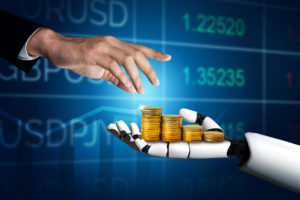Investing in Artificial Intelligence: We feel it could have a huge positive potential, but watch for these risks and rewards

Artificial Intelligence (AI) only crossed the fiction-to-news barrier in recent years, after decades as a staple of Arnold Schwarzenegger films, but it’s already influencing the economy and is likely to increase its impact. We feel it could have a huge positive potential. This development has also caught the attention of many investors who are contemplating the prospects of investing in AI.
Media comments on this subject abound, as do surveys. The average person seems fascinated with AI’s potential for good, but wary of its potential for harm. You might say this resembles the atmosphere a decade or so ago when self-driving cars started appearing in the news.
In both cases, middle-of-the-roaders were in the majority. Extreme types came up with much different outlooks.
Negative observers said self-driving vehicles would lead to an economic collapse because multitudes of drivers of trucks, taxis, buses and so on would lose their jobs.
At the other end of the spectrum, a smaller extreme felt driver-less vehicles would balloon human productivity and expand wealth around the world. After all, people could do valuable work in traffic, just as well as in an office, or use the time for a nap. They looked forward to a day when owning your own car would be a needless extravagance. When you needed a lift, you’d just summon a driver-less limo on your cellphone. A little further along, new homes will be available with or without garages or parking spots. Your self-driver will be able to valet itself to a community parking lot.
Looking a little further still, your car might be able to take itself out for maintenance, service, fuel, or any number of errands. Artificial Intelligence just might speed the arrival of these advances.
However, there’s an even wider opinion spectrum on Artificial Intelligence. Rather than a booming jobless rate, the negative side foresees Armageddon: humans versus machines.
It seems conflicts of interest are playing a role, along with honest differences of opinion, in disputes over Artificial Intelligence. This reminds me of the debate over Y2K.
The Y2K debate showed there is big money in alarmism. Some of the top Y2K promoters used Y2K fears to build a following and boost their incomes from writing, consulting or public speaking. Pessimists worried needlessly about Y2K and made a lot of money. I expect the same reaction to AI.
Mainstream opinion or Al Gore on steroids?
Ratings for cable news pioneer CNN have been slumping for a decade. Coincidentally, CNN.com recently published an essay entitled: “Experts are warning AI could lead to human extinction. Are we taking it seriously enough?”
The essay begins: “Think about it for a second … The erasure of the human race from planet Earth. That is what top industry leaders are frantically sounding the alarm about … potential dangers artificial intelligence poses to the very existence of civilization.”
It passes along a warning: “… hundreds of top AI scientists, researchers, and others … voiced deep concern for the future of humanity, signing a one-sentence (italics added) open letter to the public … mitigating the risk of extinction from AI should be a global priority alongside other societal-scale risks such as pandemics and nuclear war …”
You have to give them credit for leaving climate change off the list.
Read Marc Andreessen’s essay on AI
If you’re investing in AI and Artificial Intelligence fears keep you awake at night, I’d suggest a 7,000-word remedy by Marc Andreessen, entitled, “Why AI will save the world.”
In all I’ve read about AI, this is the best comment I’ve seen. It describes AI in plain English; explains how AI can expand human intelligence; how we have used human intelligence over millennia to create today’s world. It also speculates about the gains we may see in the new era of AI.
“Anything people do with their natural intelligence today can be done much better with AI, and we will be able to take on (note, no guarantees or deadlines) new challenges that have been impossible to tackle without AI, from curing all diseases to achieving interstellar travel.”
That covers the first few pages. Mr. Andreessen moves on to address the obvious question:
“So why the panic? In contrast to this positive view, the public conversation about AI is presently shot through with hysterical fear and paranoia. What explains this divergence in potential outcomes from near utopia to horrifying dystopia?”
Andreessen goes on to explain the concept of “a moral panic” or social contagion that convinces people that new technology is going to destroy civilization, if not the world. Fears like this have arisen many times before.
This covers about one-seventh of the essay. The remainder goes on to cover a lot of interesting stuff, including some of our favourite investment-related topics: conflicts of interest, freedom of speech, technology, the marketplace (in the economics sense), Ronald Reagan’s impact on the world, and so on.
The final paragraph of “Why AI will save the world” says a lot:
“Today, growing legions of engineers — many of whom are young and may have had grandparents or even great-grandparents involved in the creation of the ideas behind AI — are working to make AI a reality, against a wall of fear-mongering and doomsterism that is attempting to paint them as reckless villains. I do not believe they are reckless or villains. They are heroes, every one. My firm and I are thrilled to back as many of them as we can, and we will stand alongside them and their work 100%.”
To read the entire essay — which I strongly recommend — go here.
I first heard of Mr. Andreessen in the mid-1990s, when he co-founded Netscape, which published Netscape Navigator, the first widely popular web browser. He went on to great success in software engineering and venture capital while occasionally writing freelance.
Prior to “Why AI will save the world,” the best of his freelance work was an August 20, 2011, piece for The Wall Street Journal entitled, “Why Software Is Eating The World.”
I’ve mentioned this essay before. It’s still a highly valuable read. To see for yourself, go to here.
Andreessen is now publishing on Substack.com, a 2017 start-up, which later acquired backing from Andreessen Horowitz, Marc Andreessen’s VC firm. Substack offers a fully equipped newsletter publishing platform for 10% of each publisher’s revenues.
Andreessen may have chosen to publish his AI thoughts on Substack instead of The Wall Street Journal or the New York Times or other top publications because his Substack investment may give him editorial leeway that’s unavailable to a freelancer.
He now offers his Substack newsletter to the public for free. He may see it as free advertising for his venture capital business, or because he plans to enter politics one day.
I’d say your biggest risk from AI is the stock promoters and GRQ (Get Rich Quick) publishers who claim to know about speculative stocks that are sure to pay off.
Our view is that AI will pay off best for well-established companies that put it to constructive use. The market is not yet taking these potential gains into account.
What do you think? Are you investing in AI?
 Pat McKeough has been one of Canada’s most respected investment advisors for over three decades. He is the founder and senior editor of TSI Network and the founder of Successful Investor Wealth Management. He is also the author of several acclaimed investment books. This article was published on Feb. 7, 2024 and is republished here with permission.
Pat McKeough has been one of Canada’s most respected investment advisors for over three decades. He is the founder and senior editor of TSI Network and the founder of Successful Investor Wealth Management. He is also the author of several acclaimed investment books. This article was published on Feb. 7, 2024 and is republished here with permission.

